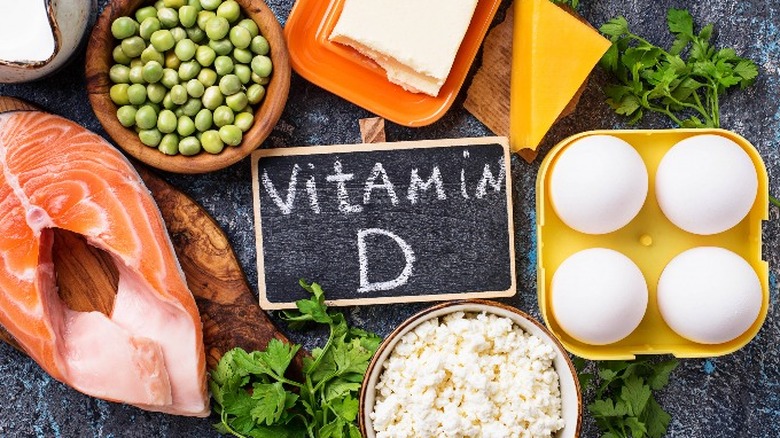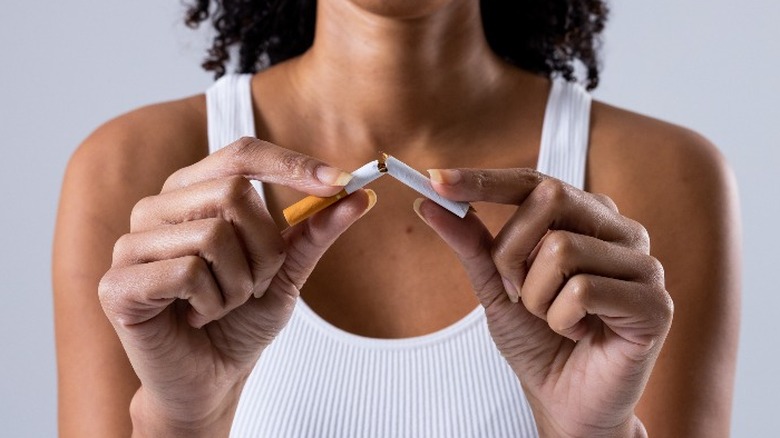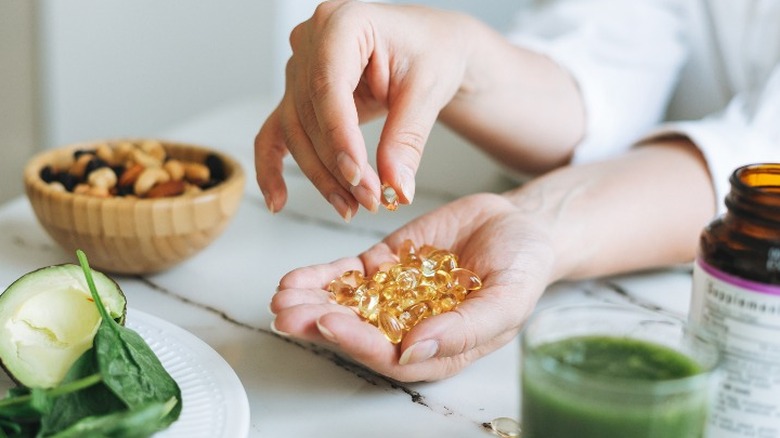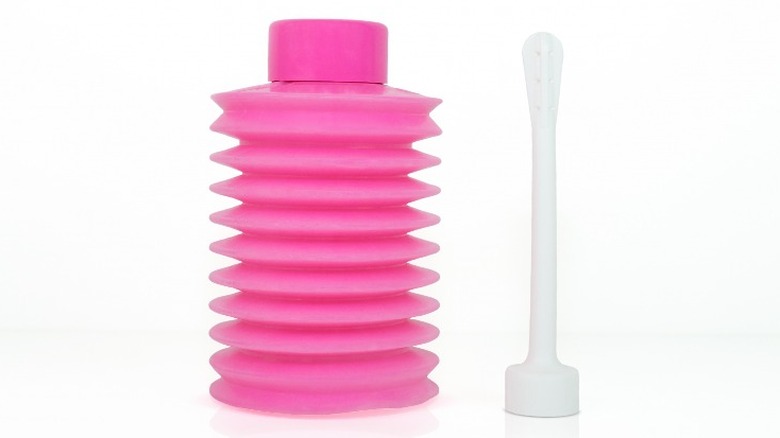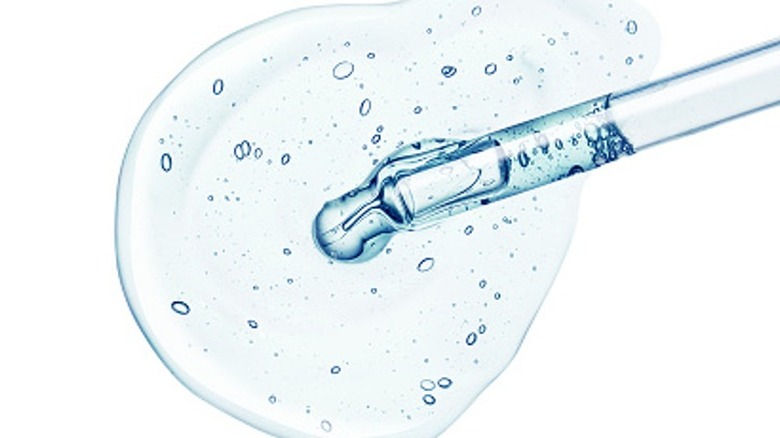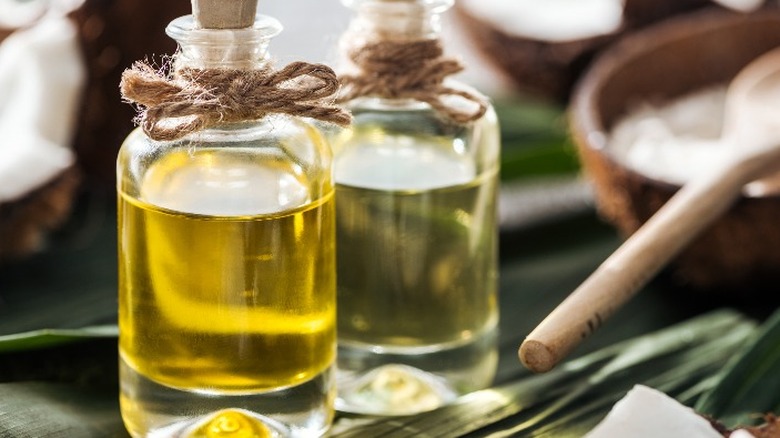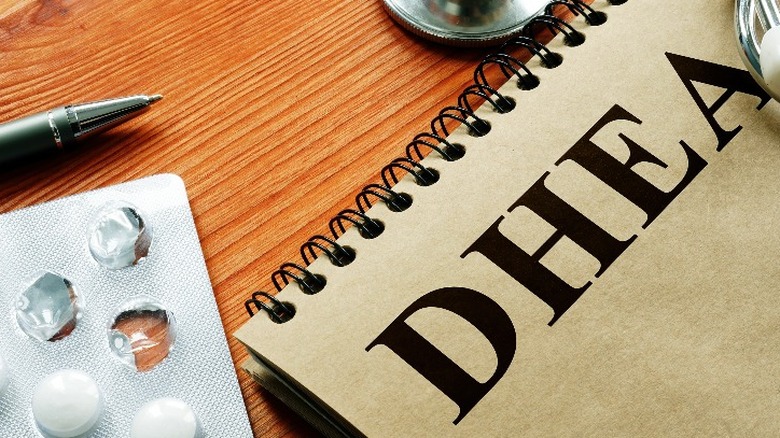Natural Ways To Help Beat Back Vaginal Dryness
Vaginal dryness is an uncomfortable and often painful issue that many women have to deal with. Also called vaginal atrophy, it happens when the vagina is not as lubricated as it should be, which causes the vaginal walls to become thin, dry, and less elastic. This dryness can cause noticeable discomfort, itchiness, soreness, and pain during sex (via Cleveland Clinic).
Not enough lubrication in the vagina also means there is less moisture in the vulva area, which includes the labia and clitoris. The opening of the urethra will also become drier, which can lead to feeling like you need to urinate more often. You may even develop recurrent urinary tract infections (UTIs) due to vaginal dryness because harmful bacteria can multiply when the vagina's balance is disrupted, according to an article published in Climacteric.
Overall, vaginal dryness can complicate many aspects of your life. The pain and irritation of the condition can affect everything from working out to having a healthy sex life. The good news is there are several ways to combat the effects of vaginal dryness and help prevent it from coming back.
What causes vaginal dryness?
While there are several reasons why people may suffer from occasional vaginal dryness, the condition is usually linked to a decline in the female hormone estrogen. According to the American College of Obstetricians and Gynecologists (ACOG), women experience a decline in estrogen levels during and after menopause, which then leads to less lubrication in the vagina. About 25% of women between the ages of 50 and 59 suffer from vaginal atrophy, with 16% of them experiencing painful symptoms (per Women's Health Concern).
However, not all women who have vaginal dryness are postmenopausal. Other causes for low estrogen levels include breastfeeding, people who had a hysterectomy procedure or their ovaries removed, or those who received chemotherapy treatment for cancer. Also, women suffering from eating disorders, autoimmune diseases, some genetic conditions, and chronic stress may see a drop in estrogen prior to menopause. Individuals who exercise excessively are at risk of hypothalamic amenorrhea, which can stop estrogen production as well (via Cleveland Clinic).
If you struggle with vaginal dryness, it's important to talk to your doctor or OBGYN about possible treatments. There are also natural ways to tackle the symptoms, regain your confidence, and stay on top of your vaginal health.
Take vitamin E supplements
Vitamin E is an essential nutrient that supports several bodily functions. The Office of Dietary Supplements notes that vitamin E is especially important to help protect cells from damaging free radicals produced in our bodies and found in air pollution, smoke, and ultraviolet rays. Vitamin E can also boost immunity, help prevent blood clotting, and support healthy interaction between cells.
Another vital role that vitamin E plays in overall health is stabilizing estrogen. A study published in the Iranian Journal of Nursing and Midwifery Research found that vitamin E suppositories inserted into the vagina successfully relieved vaginal dryness symptoms associated with menopause. The results from the vitamin E treatments were comparable to the women who used estrogen vaginal cream during the study. This shows that vitamin E may be helpful for women with vaginal atrophy who are unable or unwilling to use hormone therapy.
While estrogen therapy is a good option for many women, the risks may be too high for others. According to Mayo Clinic, hormone therapy can increase the chance of developing heart disease, stroke, blood clots, and breast cancer. If you are already at high risk of these conditions, check with your doctor to see if vitamin E may be a good alternative to treat vaginal dryness.
Get more vitamin D
For women who notice changes in their bodies after menopause, vitamin D is another important supplement that may help alleviate vaginal dryness. Because vitamin D levels drop after menopause, a study published in the International Journal of Reproduction, Contraception, Obstetrics and Gynecology examined the connection between vitamin D deficiency and vaginal atrophy.
The results of the study showed that female participants between the ages of 65 and 78 saw a significant improvement in their vaginal health after taking vitamin D supplements for several months. Researchers used the vaginal health index to measure these improvements, which include vaginal elasticity, secretions, pH, hydration, and the epithelial mucous membrane. In addition, a review in the Journal of Menopausal Medicine shared that vitamin D did decrease vaginal dryness and improve vaginal pH levels in menopausal women.
How much vitamin D do you need to improve your vaginal health? More research is needed to conclusively determine what type of supplementation works best and how much you should take to get the best outcomes. However, vitamin D is also crucial for bone health and immune function, so it doesn't hurt to look into a vitamin D supplement to boost your overall health.
Give up smoking
Cigarettes are connected to what seems like an infinite list of health risks and conditions, including cancer, heart disease, lung disease, diabetes, chronic respiratory infections, and more. You can also put your family and friends at risk of developing issues when exposed to secondhand smoke. Along with all the negative effects nicotine and the toxins found in cigarettes can have on your body, it comes as no surprise that smoking can also impact your vaginal health.
One study published in the journal In Vivo compared the vaginal health of smokers and non-smokers after menopause. The results showed a significant difference in vaginal atrophy symptoms, with smokers experiencing more considerable vaginal changes. The study also found that smokers, on average, went through menopause two years sooner than non-smokers. Because menopause causes estrogen levels to drop, many postmenopausal women experience vaginal dryness. By giving up smoking now, you may be avoiding early menopause and all the uncomfortable symptoms that come with it.
Practice yoga
Stress, anxiety, and other mental health issues can take a physical toll on the body in more ways than one. According to an article in Forbes, vaginal atrophy is just one of the effects that women experience when under a lot of mental pressure. It turns out that stress can affect blood flow to the vagina, which inhibits healthy lubrication. It's also common for women to skip periods, have a low sex drive, experience pain during sex, and suffer from tightness in the pelvic floor muscles.
One way to combat stress levels that could be contributing to vaginal dryness is to practice yoga. As explained by the National Center for Complementary and Integrative Health, yoga is an immersive practice based on ancient Indian philosophy that aims to promote physical and mental health. Because yoga incorporates meditation, deep breathing, and physical movement, it can relieve stress, boost emotional health, reduce pain, and even relieve menopausal symptoms.
In addition, Yoga Journal shares that certain yoga poses and restorative postures can help the body adjust to fluctuations in hormones during menopause. Making some modifications to poses can also help to calm nerves and irritability, which are both associated with emotional stress.
Do daily Kegel exercises
When a lack of vaginal lubrication gets in the way of your sexual relationships and intimacy with your partner, it can be uncomfortable and embarrassing. However, strengthening your pelvic floor muscles may help to fight vaginal dryness. Kegel exercises focus on contracting and relaxing the pelvic floor muscles as a way to strengthen them and support the vagina and other organs connected to them. When you consistently do Kegel exercises, it may improve circulation to the vaginal tissues and glands, which can boost libido and lubrication (via UChicago Medicine).
If you've never done Kegel exercises before, the good news is they're easy and can be done just about anywhere, including from your desk. Because of where the pelvic floor is located, contracting those muscles is a discrete movement that doesn't require you to make any big movements. You simply tighten the muscles you use to start and stop your urine stream, hold it for several seconds, then release before repeating (via Mayo Clinic).
Get more vitamin A
While vitamin A is commonly associated with healthy eyes and vision, this crucial nutrient is a powerhouse vitamin that aids in several functions in the body. For example, vitamin A supports the immune system, reproductive health, and heart and lung function. According to Harvard Health, it's also essential for healthy endothelial cells, which are the cells that make up the lining of all interior surfaces of the body — including the lining and mucous membranes in the vagina (via the University of Rochester Medical Center).
Getting more vitamin A in your diet could promote healthier vaginal tissue, which may ultimately help combat dryness and atrophy. Although you can take vitamin A supplements, there are plenty of natural ways to boost your intake. Meats and fish that are high in vitamin A include beef liver, lamb liver, king mackerel, and bluefin tuna. Also, look for foods that are rich in beta-carotene, which is a provitamin that your body converts to vitamin A. Vegetables like sweet potatoes, carrots, butternut squash, and kale are excellent sources of beta-carotene.
Increase your omega-3 fatty acid intake
Omega-3 fatty acids are healthy fats that provide a myriad of benefits, including a healthy heart and brain, reducing inflammation, and helping ease symptoms of depression and anxiety. There also seems to be a connection between omega-3s and improvements in people with psychiatric or mental disorders.
Another perk of omega-3 fatty acids is the possible effect it has on vaginal atrophy. A study published by The Ohio State University found that omega-3s significantly reduced vaginal dryness for several months in postmenopausal women who survived breast cancer. There was also a decrease in irritation, tearing, and pain connected to sexual intercourse. Prior to the study, these participants were experiencing dryness, irritation, and itching associated with vaginal atrophy.
If you want to get more omega-3 fatty acids, seafood is typically a good choice. Fish that are the best sources of these essential fatty acids include salmon, mackerel, seabass, and sardines. You will also find plenty of omega-3s in oysters, shrimp, and other shellfish. However, if you're not a fan of seafood or have an allergy, talk to your doctor about possible omega-3 supplements that may be right for you.
Stop douching
If you're years away from menopause and are likely not experiencing any hormonal fluctuations, there may be another reason for your sudden vaginal dryness symptoms. Douching, or the process of washing out the vagina with water or a special liquid solution, could be the culprit behind the irritation.
A healthy vagina has a good balance of beneficial bacteria called Lactobacillus, which act as an antimicrobial that fights infections by maintaining an acidic pH level. According to Medical News Today, douching can disrupt this important balance of bacteria and a slightly acidic environment, leading to irritation and vaginal dryness. Additionally, the ingredients or scents found in douches can increase vaginal drying (via Healthline).
The Office of Women's Health shares that doctors caution women against douches because of the many health risks they present. While it may have been a popular practice in past decades and thought to support good hygiene, it turns out it's more problematic than beneficial. Instead, the Mayo Clinic suggests only using warm water to clean the outside of the vagina. You can also use mild soap, but you should never insert soap or other hygiene products into the vagina.
Try a hyaluronic acid gel
As described by Cleveland Clinic, hyaluronic acid is a slippery substance naturally produced by the body to help lubricate joints and keep skin hydrated and elastic. You may have seen hyaluronic acid as a popular ingredient in skincare products developed to fight signs of aging, including dry skin and wrinkles. This is because hyaluronic acid has the incredible ability to retain a significant volume of water in just a small amount of the substance.
Because of its impressive hydrating properties, hyaluronic acid may also be a good treatment for vaginal dryness. Vaginal gels that contain hyaluronic acid can be applied to the vagina to help the lining and mucosa fight dryness, irritation, itchiness, painful sex, and other symptoms by restoring and retaining moisture (via National Cancer Institute).
In fact, a study published in the Archives of Gynecology and Obstetrics found that hyaluronic acid vaginal gel was an acceptable alternative to treat vaginal dryness when compared to creams that contain estrogen. About 49% of participants reported an improvement in vaginal dryness, while 53% of women showed symptom improvements with estrogen-based vaginal cream.
Ask your doctor about natural oils as vaginal lubricants
If you're looking for a natural vaginal moisturizer or personal lubricant, you may have heard that coconut oil and other types of oils can help. While there is still some debate on whether they are effective, several people prefer this natural approach compared to synthetic lubricants that may cause irritation.
According to a study published in the International Journal of Dermatology, coconut oil does reduce water loss, strengthens the skin barrier, and helps to hydrate skin in children with atopic dermatitis, which is a chronic skin condition. This research could suggest that coconut oil may also help with other types of skin issues characterized by drying and irritation (via Medical News Today). However, there is no recorded evidence that coconut oil would produce the same results on vaginal dryness.
There are other oils that may be possible remedies for symptoms of vaginal atrophy, including grape seed oil, olive oil, and sunflower oil (via Cleveland Clinic). These natural oils can be applied externally as a lubricant before sex to help prevent discomfort during intercourse. Just keep in mind that these oils can potentially damage condoms, making them less effective. Talk to your doctor about using natural oils for lubrication to see if it may be a good option for you.
Vaginal DHEA treatment
Another way to tackle the symptoms of vaginal atrophy is intravaginal dehydroepiandrosterone (DHEA) treatment. As explained by Mount Sinai, DHEA is a hormone that declines with age, which suggests that supplementation to increase DHEA levels may relieve some signs of aging. Along with other uses, DHEA supplements have been shown to raise estrogen levels in some postmenopausal women and treat vaginal dryness and low sex drive.
While research and study results have been mixed, one study published in Menopause found that a daily intravaginal application of DHEA significantly improved vaginal dryness in 84% of the test group participants over a 12-week period. Also, there were no major side effects of the DHEA treatment during the trial, which may show that this approach could be promising.
You should always consult with a healthcare professional before taking any DHEA supplements or treatments for vaginal dryness. DHEA has the potential to interact with some medications and other supplements or increase the risk of developing hormone-related health conditions (per Mount Sinai). It may also be problematic for those with a history of depression, bipolar disorder, liver issues, and diabetes.
Prioritize hydration
If you're experiencing dryness and irritation in the vagina and vulvar area, it's possible that dehydration is not helping the situation. According to Stony Brook Medicine, drinking water can help boost vaginal health in several ways. For one, it hydrates the skin and mucous membranes that are vital to keeping the vagina lubricated. This lubrication counters uncomfortable symptoms like pain during sex and itchiness caused by dry skin.
Also, being dehydrated can throw off the natural pH balance in the vagina, which can lead to irritation, infections, and other complications. "Yeast and bacterial infections occur when there is a disruption of the normal pH balance caused by dehydrated skin in and around the inside of the vagina," Dr. Sherry A. Ross, author of "She-ology: The Definitive Guide to Women's Intimate Health. Period.," told Glamour.
Mayo Clinic shares that women should get at least 11.5 cups or 92 ounces of water every day. For those who struggle to hit that benchmark, there are some things you can do to boost your water intake to support your vaginal health and overall well-being. Try adding some flavor to your water, like lemon, cucumber, or water-enhancing drops or powders. You can also keep a bottle of water with you at all times and get in the habit of taking sips throughout the day.
Practice self-love
While some women may have been taught that masturbation is taboo or something to avoid, female masturbation actually has several benefits. The National Women's Health Network (NWHN) shares that masturbation can ease the pain of menstrual cramps, relieve muscle tension, strengthen pelvic floor muscles, reduce stress, and improve self-esteem. Additionally, an article in Forbes explains that masturbation can increase libido and blood flow to the vagina and vulva, which stimulates lubrication that fights the symptoms of vaginal atrophy and dryness.
Because women often experience vaginal atrophy during and after menopause, it's more important than ever to focus on sexual health to reduce dryness and other symptoms. According to NWHN, sex therapists believe there is some truth to the "use-it-or-lose-it" idea. When women keep up with sexual activity, including regular masturbation, it helps to keep the vagina moist and flexible. This can help reduce discomfort during intercourse and combat lowered sexual desire.




